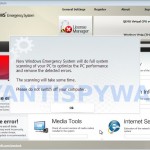 Windows Emergency System is a rogue antispyware program which uses the name of Microsoft Windows and pretends to be a legitimate malware removal tool. The rogue from the family of fake Microsoft Security Essentials Alert malware that hides Windows desktop, disables legitimate antvirus applications, blocks Windows programs from running and displays fake security alerts in order to trick you into thinking your computer is infected. It hopes that you will next purchase so-called full version of the software. Do not pay for the bogus software! You should never trust in anything related to this application and remove Windows Emergency System from your computer as quickly as possible!
Windows Emergency System is a rogue antispyware program which uses the name of Microsoft Windows and pretends to be a legitimate malware removal tool. The rogue from the family of fake Microsoft Security Essentials Alert malware that hides Windows desktop, disables legitimate antvirus applications, blocks Windows programs from running and displays fake security alerts in order to trick you into thinking your computer is infected. It hopes that you will next purchase so-called full version of the software. Do not pay for the bogus software! You should never trust in anything related to this application and remove Windows Emergency System from your computer as quickly as possible!
As all rogueware applications from same family, Windows Emergency System is distributed with the help of trojans. When the trojan is started, it will block important Windows applications (e.g. Task Manager, Internet Explorer, etc) from running and display false information that states “Unknown Win32/Trojan was detected on your computer”. The fake alert will prompt to perform a scan of your PC. Once the scan is complete, it will suggest to install WindowsEmergency System to remove the trojan. If you confirm it by clicking to OK button, this malware will download and install Windows Emergency System and then restart your PC.
When Windows is loaded, you will be shown the Windows Emergency System prompt instead of Windows desktop. The fake antivirus will suggest to click “OK” button to start a system scan. After click to it, the rogue will perform a fake scan of your computer and list a lot of infections to trick you into thinking your PC in danger. It will report that was able to clean the majority of infected files, but was not able to cure a few important Windows files and offer to purchase its full version to clean them. However, the scan results is a scam, because the program is neither able to detect, nor to remove anything from your computer, especially viruses or other kind of malware. Thus, do not pay for the bogus software, simply ignore all that the fake antivirus will display you.
While Windows EmergencySystem is running, it will display display a variety of fake security warnings and block legitimate Windows applications on your computer. Some of the alerts are:
Attention
Suspicious software activity is detected.
Please start system files scanning for details.
Warning!
Name: taskmgr.exe
Name: C:\WINDOWS\taskmgr.exe
Application that seems to be a key-logger is detected. System information security is at risk. It is recommended to enable the security mode and run total System scanning.
Just like false scan results above, all of these alerts are a fake and supposed to scare you into thinking your computer is in danger. You should ignore all of them!
As you can see, Windows Emergency System is a scam. Most importantly, do not purchase it! Instead of doing so, follow the removal instructions below in order to remove Windows Emergency System and any associated malware from your computer for free.
Automatic removal instructions for Windows Emergency System virus
Step 1. Stop Windows Emergency System from “autorunning”
Once Windows loaded you will see a Windows Emergency System prompt.
Click OK button. Once fake scan is complete, it will state you need to open the License Manager.
Press the “OK, Open the license manager” button. Now you can close the program. Click “X” button at the top-right of WindowsEmergency System or press ALT + F4. After that your Windows Desktop will be available.
Click Start, Type in search field (if you use Windows XP, then Click Start, Run and type in Open field):
%APPDATA%
Press Enter. It will open the contents of Application Data folder (for Windows XP) or the contents of Roaming folder (for Windows Vista, Windows 7). Next open the Microsoft folder as shown in the screen below.
Locate randomly named file (e.g. opcvla.exe or opcvla, look the example above), right click to it and select Rename. Type any new name (123.exe) and press Enter. Reboot your computer.
Step 2. Remove Windows Emergency System associated malware
Download MalwareBytes Anti-malware (MBAM). Once downloaded, close all programs and windows on your computer.
Double-click on the icon on your desktop named mbam-setup.exe. This will start the installation of MalwareBytes Anti-malware onto your computer. When the installation begins, keep following the prompts in order to continue with the installation process. Do not make any changes to default settings and when the program has finished installing, make sure a checkmark is placed next to “Update Malwarebytes’ Anti-Malware” and Launch “Malwarebytes’ Anti-Malware”. Then click Finish.
MalwareBytes Anti-malware will now automatically start and you will see a message stating that you should update the program before performing a scan. If an update is found, it will download and install the latest version.
As MalwareBytes Anti-malware will automatically update itself after the install, you can press the OK button to close that box and you will now be at the main menu. You will see window similar to the one below.
Make sure the “Perform quick scan” option is selected and then click on the Scan button to start scanning your computer for Windows Emergency System infection. This procedure can take some time, so please be patient.
When the scan is finished a message box will appear that it has completed scanning successfully. Click OK. Now click “Show Results”. You will see a list of infected items similar as shown below.
Note: list of infected items may be different than what is shown in the image below.
Make sure all entries have a checkmark at their far left and click “Remove Selected” button to remove Windows Emergency System. MalwareBytes Anti-malware will now remove all of associated WindowsEmergencySystem files and registry keys and add them to the programs’ quarantine. When MalwareBytes Anti-malware has finished removing the infection, a log will open in Notepad and you may be prompted to Restart.
Windows Emergency System removal notes
Note 1: if you can not download, install, run or update Malwarebytes Anti-malware, then follow the steps: Malwarebytes won`t install, run or update – How to fix it.
Note 2: if you need help with the instructions, then post your questions in our Spyware Removal forum.
Note 3: your current antispyware and antivirus software let the infection through ? Then you may want to consider purchasing the FULL version of MalwareBytes Anti-malware to protect your computer in the future.
Windows Emergency System creates the following files and folders
%AppData%\Microsoft\{RANDOM}.exe
Windows Emergency System creates the following registry keys and values
HKEY_LOCAL_MACHINE\SOFTWARE\Microsoft\Windows NT\CurrentVersion\Image File Execution Options\avastsvc.exe
HKEY_LOCAL_MACHINE\SOFTWARE\Microsoft\Windows NT\CurrentVersion\Image File Execution Options\avastui.exe
HKEY_LOCAL_MACHINE\SOFTWARE\Microsoft\Windows NT\CurrentVersion\Image File Execution Options\msascui.exe
HKEY_LOCAL_MACHINE\SOFTWARE\Microsoft\Windows NT\CurrentVersion\Image File Execution Options\msmpeng.exe
HKEY_LOCAL_MACHINE\SOFTWARE\Microsoft\Windows NT\CurrentVersion\Image File Execution Options\msseces.exe
HKEY_LOCAL_MACHINE\SOFTWARE\Microsoft\Windows NT\CurrentVersion\Image File Execution Options\egui.exe | Debugger
HKEY_LOCAL_MACHINE\SOFTWARE\Microsoft\Windows NT\CurrentVersion\Image File Execution Options\ekrn.exe | Debugger
HKEY_CURRENT_USER\Software\Microsoft\Windows NT\CurrentVersion\Winlogon | Shell = “%AppData%\{random}.exe”
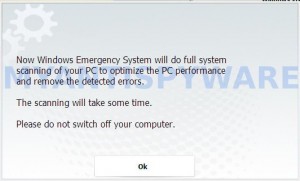
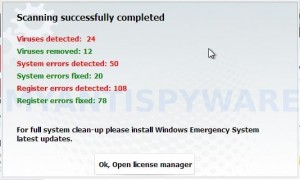
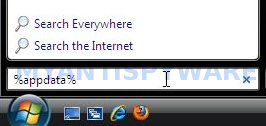
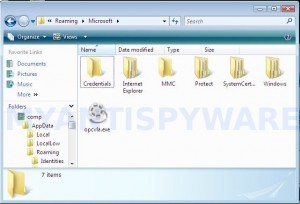
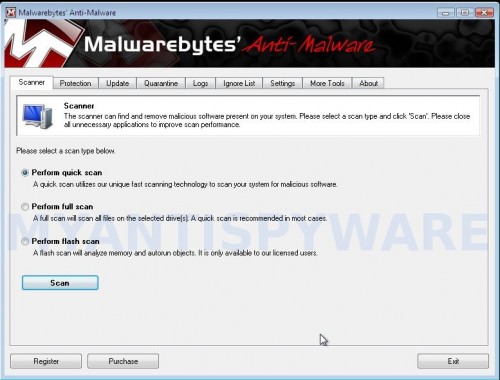
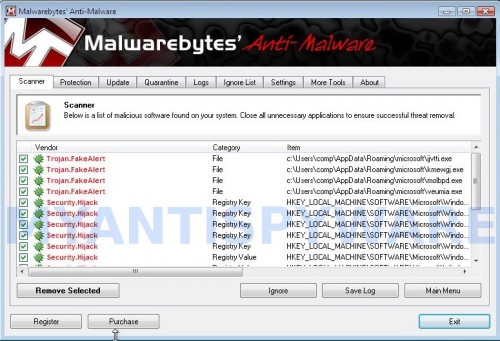











Please help, i renamed az instantly located folder (credentials) and nothing happened after reboot?!!
thanks a lot man !
What happens if I cannot find the opcvla or opcvla.exe or athing like it. Should I just try yo run he malware?
Thanks man. There was no (Random).exe file on my system so I skipped Step 1. Ran Malwarebytes and it efficiently removed this damn virus.
Glen, then run Malwarebytes.
If your still having trouble post in the forum, and a helper will assist you.
MyAntiSpyware.com Forum